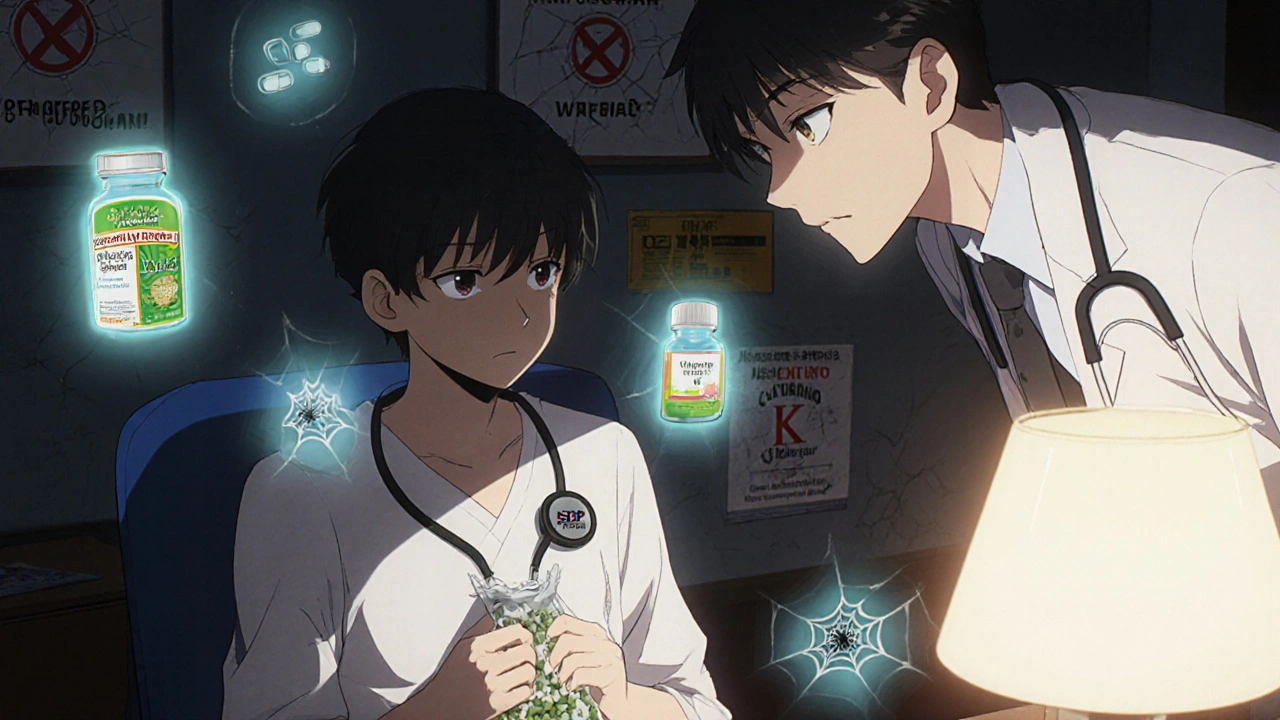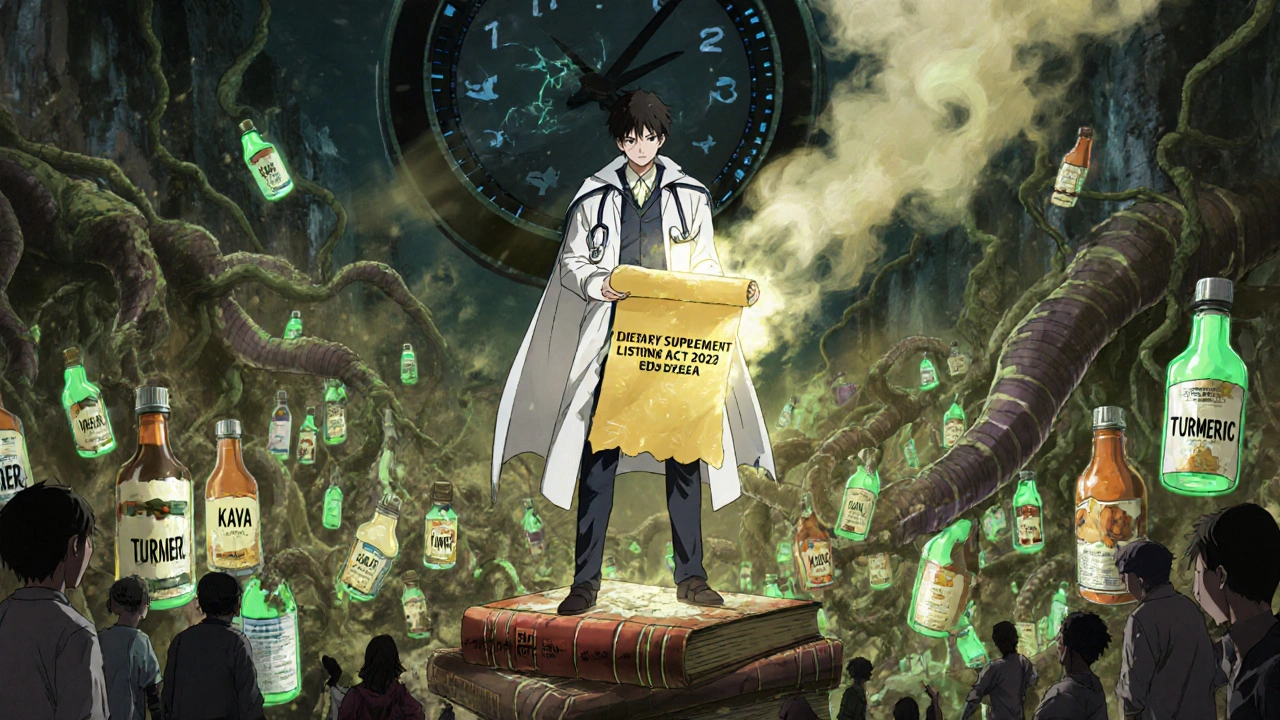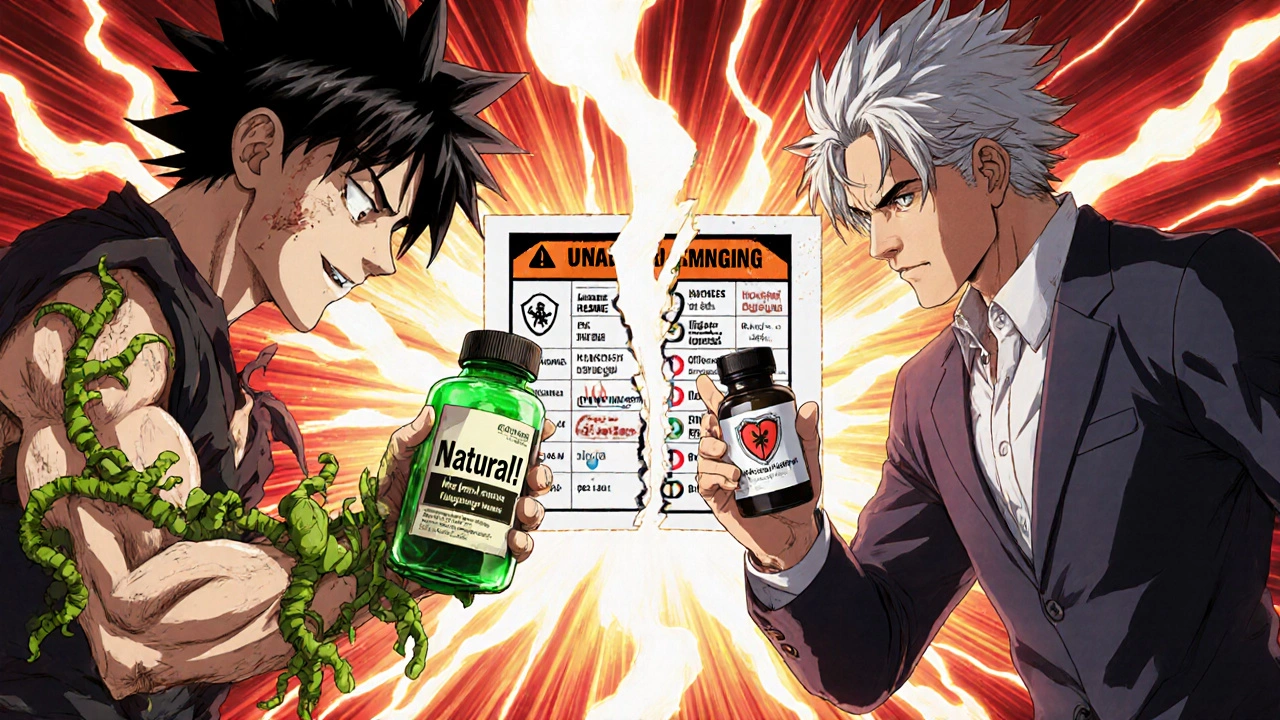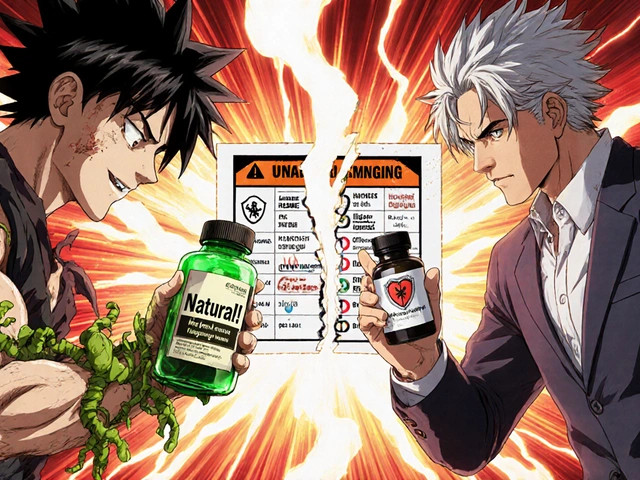People often assume that if something is labeled "natural," it must be safer than a pill from the pharmacy. You see it on shelves: herbal teas, turmeric capsules, ginkgo tablets - all promising health benefits with no "chemicals." But here’s the truth: natural doesn’t mean safe. In fact, some of the most dangerous drug interactions happen when people mix herbal supplements with their prescription meds - and they have no idea.
The Myth of "Natural = Safe"
The idea that nature is inherently pure and harmless is deeply rooted in our culture. It’s why someone will happily swallow a bottle of echinacea because it’s "all-natural," but hesitate at a simple antibiotic. The truth? Nature is full of toxins. Foxglove plants contain digitalis - the same compound used in heart medication. Eat the plant, and you risk fatal heart rhythm problems. Kava, once popular for anxiety, has been linked to severe liver damage. Ephedra, sold as a weight-loss aid, was banned by the FDA in 2004 after causing heart attacks and strokes. The problem isn’t just the plants themselves. It’s the belief that because they’re "natural," they don’t need scrutiny. Unlike pharmaceuticals, herbal supplements aren’t required to prove safety or effectiveness before hitting store shelves. Under the Dietary Supplement Health and Education Act (DSHEA) of 1994, companies can sell supplements without FDA approval. They don’t need clinical trials. They don’t need to prove they work. They just need to avoid making outright false claims.How Pharmaceuticals Are Tested - and Why It Matters
Prescription drugs go through years of testing. Before a single pill is approved, it’s studied in hundreds, sometimes thousands, of people across multiple phases. Researchers track side effects, drug interactions, dosage limits, and long-term risks. The FDA requires manufacturers to document every step of production, from raw ingredients to packaging. Facilities are inspected regularly. Post-market surveillance continues - if a drug causes unexpected harm after release, the FDA can issue warnings or pull it from the market. Compare that to a typical herbal supplement. A company buys dried root powder from a supplier, mixes it with fillers, puts it in a capsule, and ships it. There’s no requirement to test how it interacts with blood pressure meds, antidepressants, or birth control. No mandatory reporting of adverse events. No standardized potency. One bottle of turmeric might have 500mg of curcumin; another might have 50mg - and you’d never know the difference.Supplement Interactions Are Real - and Often Deadly
St. John’s wort is one of the most dangerous offenders. It’s marketed as a natural antidepressant. But it can make birth control pills fail, reduce the effectiveness of blood thinners like warfarin, and interfere with HIV medications, cancer drugs, and even some antidepressants. People taking it for mood support have ended up in the hospital because their other meds stopped working. Ginkgo biloba, often taken for memory, can increase bleeding risk when combined with aspirin, ibuprofen, or warfarin. Garlic supplements can thin the blood too - a problem before surgery. Green tea extract, sold for weight loss, has caused liver failure in some users. Even something as simple as vitamin K can cancel out the effects of warfarin, turning a carefully managed dose into a dangerous gamble. The Mayo Clinic reports that natural doesn’t mean safe. And yet, 70% of people don’t tell their doctor they’re taking supplements. Why? Because they think it’s harmless. Or they forget. Or they assume their doctor doesn’t care. That’s the real danger: the silence between patient and provider.
The Numbers Don’t Lie - But They’re Misunderstood
You’ll hear people say, "100,000 people die every year from prescription drugs, but hardly anyone dies from herbs." That’s true - but it’s misleading. The reason herbal deaths are rare isn’t because they’re safe. It’s because they’re underreported. The FDA’s MedWatch system got just 1,200 reports of adverse events from dietary supplements in 2022. Meanwhile, prescription drugs generated over 120,000 reports. That doesn’t mean supplements are 100 times safer. It means most people don’t connect their nausea, dizziness, or liver pain to that new turmeric capsule they started last month. They don’t report it. Their doctor doesn’t ask. The system doesn’t track it well. Plus, the supplement industry is massive - $50 billion in the U.S. alone. And it’s growing fast. With so many products on the market, poor quality control, and inconsistent labeling, the risk isn’t in the number of deaths - it’s in the number of people quietly harmed without anyone noticing.What You Can Do to Stay Safe
If you take supplements - or are thinking about it - here’s what you need to do:- Tell your doctor - every supplement, every herb, every vitamin. Even if you think it’s "just a tea." Write it down and bring the bottle to your appointment.
- Check for interactions - use the NIH’s Office of Dietary Supplements website or MedlinePlus. Don’t rely on Amazon reviews or Instagram influencers.
- Look for third-party verification - products with the USP Verified Mark have been tested for purity, potency, and contamination. Only about 15% of brands have this. It’s worth paying extra for.
- Don’t assume "natural" means gentle - some herbs are powerful. They can affect your liver, kidneys, heart, and brain just like drugs.
- Stop before surgery - many supplements increase bleeding risk. Your surgeon needs to know what you’re taking, even if it’s "just garlic."

The Bigger Picture: Regulation Is Lagging
The Dietary Supplement Health and Education Act was written in 1994. Back then, supplements were mostly vitamins and fish oil. Now, we have concentrated extracts, synthetic analogs of plant compounds, and products marketed as "natural alternatives" to antidepressants, diabetes meds, and even cancer treatments. The FDA has limited resources. In 2023, they issued only 35 warning letters to supplement companies - despite thousands of products being sold with unproven claims and dangerous ingredients. A new bill, the Dietary Supplement Listing Act of 2023, is currently in Congress. It would require manufacturers to register products and submit safety data before selling them. If it passes, it could change the game. Until then, the burden is on you. You can’t trust labels. You can’t trust marketing. You can’t trust the assumption that "nature knows best."Bottom Line: Safety Isn’t About Natural or Synthetic - It’s About Awareness
There’s no magic line between "good" and "bad" based on whether something comes from a plant or a lab. What matters is quality, dosage, and how it interacts with your body and your other meds. Pharmaceuticals have risks - yes. But they’re documented, studied, and monitored. Supplements? Most of them are a gamble. The safest choice isn’t the one labeled "natural." It’s the one you’ve talked through with your doctor - whether it’s a pill, a tea, or a capsule.Are herbal supplements regulated like prescription drugs?
No. Prescription drugs must pass rigorous FDA testing for safety and effectiveness before they’re sold. Herbal supplements are classified as dietary supplements under DSHEA, meaning they don’t need FDA approval before going to market. Manufacturers are only required to follow basic manufacturing standards and can’t claim to treat diseases - but enforcement is weak.
Can natural supplements interact with my medications?
Yes, and often dangerously. St. John’s wort can reduce the effectiveness of birth control, antidepressants, and HIV meds. Ginkgo and garlic can increase bleeding risk when taken with blood thinners. Even common supplements like vitamin K can interfere with warfarin. These interactions are real, documented, and sometimes life-threatening.
Why don’t more people know about supplement risks?
Marketing plays a big role. The word "natural" triggers a psychological bias that makes people assume safety. Many believe the FDA tests supplements before sale - but that’s false. A 2022 Consumer Reports survey found 68% of supplement users thought the FDA approves them. Most also don’t tell their doctors they’re taking them, leaving dangerous gaps in care.
Is there a safe way to use herbal supplements?
Yes - but only with caution. Talk to your doctor first. Look for products with the USP Verified Mark, which means they’ve been independently tested for quality and purity. Avoid mega-doses. Don’t combine multiple supplements without professional advice. And never use them to replace prescribed treatment without consulting your provider.
Should I stop taking supplements if I’m on medication?
Not necessarily - but you must check. Some supplements are fine in low doses with your meds; others aren’t. For example, magnesium can help with constipation caused by opioids, and vitamin D supports bone health when taking steroids. But without knowing your full regimen, it’s impossible to say. Always disclose everything to your doctor or pharmacist.



robert cardy solano
November 21 2025Been taking turmeric for my knees for years. Never thought twice until my buddy ended up in the ER after mixing it with his blood thinner. Turned out his bottle had twice the curcumin it claimed. Scary stuff.
Turns out 'natural' just means 'unregulated.' I don't trust anything without a barcode and a clinical trial.
Rebecca Cosenza
November 21 2025People who think herbs are safe are just naive. 🙄
Cinkoon Marketing
November 22 2025Okay but let’s be real - if you’re swallowing random powders from a guy on Instagram who says ‘this cures cancer’ and calls it ‘ancient wisdom,’ you deserve what you get.
But the real problem? Pharma companies spend billions hiding side effects while herbal brands don’t even have to list ingredients properly. It’s not that supplements are evil - it’s that the whole system is broken.
I used to buy every ‘detox tea’ on the shelf. Then I found out my ‘miracle ginger root’ had lead levels higher than tap water in Flint. No one tests this stuff. No one checks. And the FDA? They’re out here issuing 35 warning letters a year to 50,000 products.
My doctor doesn’t ask about supplements because she knows I won’t tell her. I didn’t even know I was supposed to. We’re all just guessing.
And now we’ve got kids on ‘natural anxiety gummies’ that contain kava and melatonin in doses that would make a sleep doctor sweat.
It’s not about being anti-natural. It’s about being pro-transparency. If you want to take something, prove it’s safe. Don’t make me Google ‘can ginkgo kill you’ at 2 a.m. before surgery.
And yes, I’ve had my liver enzymes checked twice since I stopped the ‘energy boost’ blend. Worth it.
Stop romanticizing plants. Some of them evolved to kill you. That’s why we have pharmaceuticals - because we learned the hard way.
swatantra kumar
November 23 2025Bro, in India we’ve been using ashwagandha for 5,000 years 🤓 and now you’re scared of turmeric? 😂
Also, your ‘rigorous’ pharma drugs? Made in China, tested in labs with no oversight. Who’s really playing God here? 🤔
And why do you think we’re the only ones who don’t have 10,000 lawsuits every year? Tradition > lab reports sometimes.
Also, your ‘USP Verified’ mark? Costs $10k to get. Small farmers can’t afford that. So now the ‘safe’ stuff is only for rich people? That’s not safety - that’s capitalism. 🇮🇳💪
Brianna Groleau
November 23 2025I just want to say - I used to think supplements were harmless until my mom had a stroke after taking garlic pills with her blood pressure med. She didn’t tell anyone because she thought it was ‘just garlic.’
It broke my heart. We sat in the hospital for three days while they tried to reverse the bleeding. No one asked her what she was taking. Not even the nurse.
Now I carry a little notebook with every supplement I take - and I make my whole family do the same. Even my 70-year-old uncle who swears by ‘herbal viagra’ now shows his bottle to his cardiologist.
It’s not about fear. It’s about love. If you care about someone, you ask them what’s in their cup. You don’t assume. You don’t ignore. You listen.
And if you’re reading this and you’ve never told your doctor about your ‘natural’ sleep aid? Do it today. Just do it. For them. For you.
Because the silence? That’s the real poison.
Rusty Thomas
November 25 2025THEY’RE LYING TO YOU. EVERY SINGLE DAY.
THE FDA IS IN BED WITH BIG PHARMA. THEY WANT YOU TO THINK HERBS ARE DANGEROUS SO YOU’LL KEEP BUYING THEIR $500 MONTHLY PRESCRIPTIONS.
EVERY ‘ADVERSE EVENT’ REPORTED? PLANTED. MADE UP. TO SCARE YOU.
MY COUSIN TOOK ST. JOHN’S WORT FOR 8 YEARS. HEALTHY AS A HORSE. NOW HE’S ‘DEPRESSED’ BECAUSE HIS DOCTOR TOOK HIM OFF IT AND GAVE HIM ZOLOFT.
THEY’RE TAKING YOUR POWER. YOUR TRADITION. YOUR NATURAL WAY OF LIFE.
STOP BELIEVING THE LIES. THE SYSTEM IS BROKEN - BUT NOT BECAUSE OF HERBS. BECAUSE OF THEM.
EVERYTHING THEY SAY IS A LIE.
YOU THINK GINKGO IS DANGEROUS? WHAT ABOUT THE 10,000 PEOPLE WHO DIED FROM VIOXX? THEY STILL SELL IT IN CANADA.
THEY’RE ALL IN IT TOGETHER.
THEY WANT YOU AFRAID. THEY WANT YOU DEPENDENT.
OPEN YOUR EYES.
THEY’RE LYING TO YOU.
Dave Wooldridge
November 26 2025Wait - so you’re telling me the government lets companies sell ‘natural’ products with no testing… but they regulate your Tylenol like it’s a nuclear warhead?
That’s not safety. That’s control.
They don’t want you healing yourself. They want you on pills. They want you dependent. They want you paying monthly.
Ever heard of the ‘Pharma Industrial Complex’? It’s real. And it’s bigger than you think.
They’re scared of turmeric because it costs $5 and works better than their $300 antidepressant.
They’re scared of you waking up.
They’re scared of you asking questions.
Don’t let them win.
Pawan Jamwal
November 27 2025Western medicine is a scam. We in India have used neem, tulsi, and ashwagandha for centuries - no FDA, no trials, no lawsuits. Just results.
You think your pills are safe? They’re made in labs with chemicals from China. Your ‘clean’ drugs? Contaminated with heavy metals and microplastics.
Meanwhile, our herbs? Grown in clean soil, harvested by hand, passed down from grandmothers.
Why do you trust a lab in New Jersey more than your own ancestors? 🇮🇳
Stop drinking the corporate Kool-Aid.
Our medicine is older than your entire system.
And it still works.
Bill Camp
November 29 2025Look - I’m not saying supplements are evil. But if you’re taking something that says ‘boosts immunity’ and doesn’t list a single active ingredient? You’re not being healthy. You’re being gullible.
And if your doctor doesn’t ask about your ‘tea’? Fire them.
They’re not your partner in health if they’re ignoring half your routine.
My mom died because her ‘natural’ sleep aid messed with her heart meds. No one asked. No one knew.
It’s not about hating herbs. It’s about demanding accountability.
Transparency. Proof. Labels. Testing.
That’s not anti-natural. That’s just responsible.
And if you can’t give me that? Then I’m not taking it.